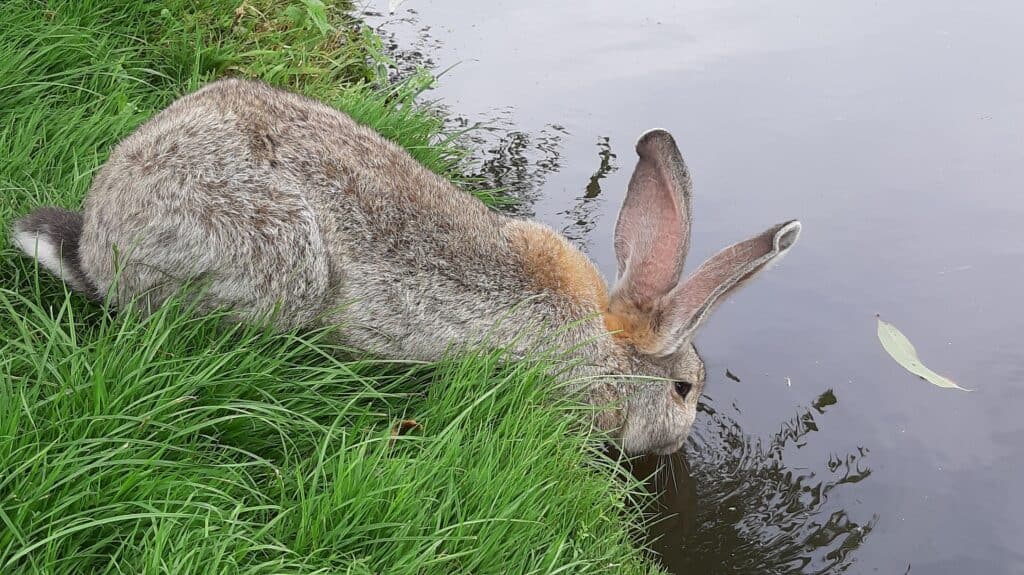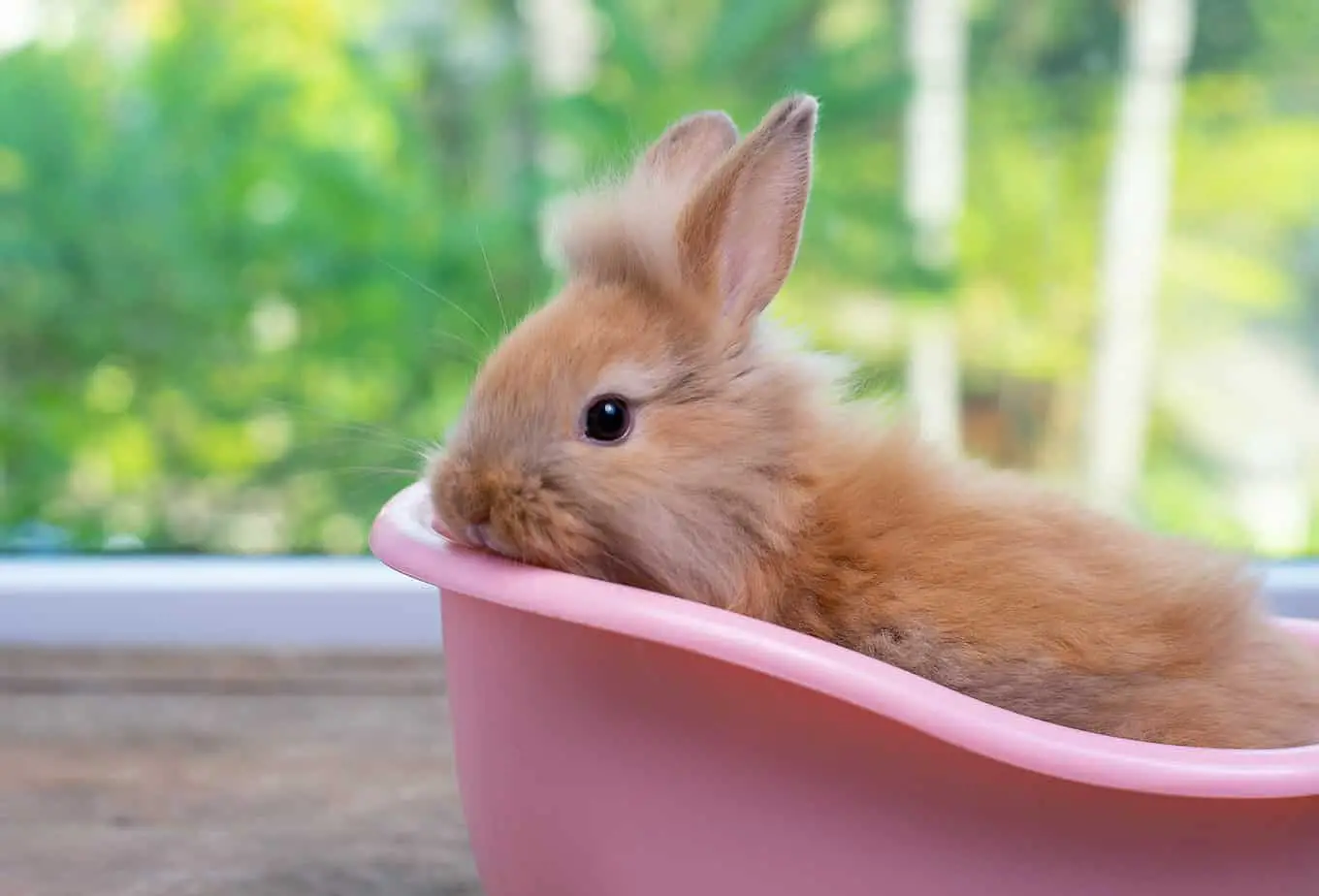
Rabbits are relatively common mammals, yet it’s always a joy to see them hopping around in the grass. However, the average suburbanite doesn’t often get the chance to see a rabbit perform all of the behaviors it would in its natural habitat. Namely, people are often curious about how rabbits react to water, and whether or not they like it.
Most rabbits do not like water. Rabbits generally do not like to get wet and should never be fully submerged in water or given a bath. While rabbits are instinctually able to swim to escape danger, exposure to water can result in serious medical problems including shock, extreme stress, or even death in severe cases.
Simply put, most rabbits only come in contact with water when it’s necessary. But what risks do they incur in the water, and are there some rabbits better adapted to swimming? Read on to discover why rabbits don’t like water, and what you should do if your rabbit gets wet.
Do Some Rabbits Actually Like Water?
While most rabbits don’t enjoy spending time in the water, this is not true of all rabbits. However, it’s important to recognize that just because a rabbit appears to like water, this may not actually be the case.
Rabbits That Actually Do Like Water
Of course, the generalization ‘rabbits don’t like water is just that–a generalization. There is one subgroup of rabbits that do very well in water: The swamp rabbits from the Gulf Coast and South Central United States.
These rabbits live in marshy areas, and as such, need to be able to swim to get around.
Swamp Rabbits are strong swimmers and don’t mind getting wet the way other rabbits do.
The secret to their adaptability is in their fur–it’s so thick and sleek as to be practically waterproof, like feathers on a duck. Generally, rabbits experience ill effects when their thick undercoats get wet, but swamp rabbits are protected by their water-resistant outer fur.
Swamp rabbits made a bit of a splash during the presidency of Jimmy Carter. The president was fishing in a marshy area of Georgia, and was surprised to see an enormous swamp rabbit swim up to his boat to say hello!
Rabbits That Look Like They Like Water
There are plenty of videos on the internet of rabbits getting baths or playing in pools. These rabbits don’t seem to be experiencing the same stress responses described above–one famous video shows a black-and-white rabbit lying on his back in a bathroom sink, for example.
It may look as if he’s really relaxed, with his eyes closed and his limbs splayed, but appearances are often deceiving.
What appears to be relaxation may actually be a stress response known as trancing or tonic immobility. Rabbits with this condition will lie with their stomachs exposed like that to ward off predators–essentially, they’re playing dead.. Rabbits only do this when they’re very badly stressed like they might be if their owner put them in water.
Can Rabbits Get Wet?
Rabbits should not get wet as this may be harmful to their health. Wet rabbits are unable to regulate body temperature well, and can result in hypothermia if not dried off quickly. If a rabbit gets wet outside when it’s raining, it should be dried off as soon as possible to avoid potential health problems.
You should begin this process with thorough towel drying. Be sure to employ the softest towel you can find.
Then, once you’ve patted your rabbit as dry as possible, use a hairdryer to get your bunny the rest of the way dry. You must set your hairdryer to the lowest heat and fan settings as the hot air can easily irritate a rabbit’s sensitive skin, nose, and eyes.
Once your rabbit is completely dry, you’ll need to keep him in a warm environment. Give it a soft blanket to cozy up in, and consider sharing your body heat with your pet by cuddling.
Do Rabbits Swim?
All rabbits instinctually know how to swim. Rabbits swim by propelling themselves through the water using their front and hind limbs. Because their hind legs are much more powerful than their front legs, this movement can be somewhat awkward.
However, rabbits aren’t generally around water enough to need to be graceful swimmers. Again, rabbits only swim when it’s totally necessary.
If rabbits swim at all, it’s because they were driven into the water by something–a predator, perhaps, or an ignorant owner
Swimming is a rabbit’s last-ditch effort to preserve itself, not something most rabbits would ever do by choice.
How Long Can Rabbits Swim?
There’s no set time frame on how long a rabbit can swim. Partially, it would depend on the strength and fitness of the individual–a young, healthy rabbit is more likely to be a strong swimmer than an old or sick one.
Since being in the water is stressful for rabbits, they naturally experience a dangerous response when swimming. This gives them an adrenaline rush, which can make them capable of great feats of strength and endurance. A rabbit immersed in water is prepared to swim for as long as it needs to to get to safety.
How Do Rabbits Learn To Swim?
Rabbits don’t need to learn how to swim. Swimming is instinctual in rabbits and does not need to be taught by the mother, unlike most mammals. While rabbits are born blind and helpless, newborn rabbits develop quickly and are usually able to swim between eight and fifteen days of age.
The question is less ‘how do rabbits learn to swim’ and even more ‘when do rabbits become capable of swimming.’ Rabbits are born relatively undeveloped, so it takes a while before they’re capable of doing many things.
However, it’s unlikely that rabbits of this age would have to swim. Baby rabbits depend on their mother so much, they usually aren’t prepared to leave the nest until they are between three and five weeks old.
Is swimming Bad for Rabbits?
Swimming is not good for rabbits as it often frightens them and triggers a negative stress response. In addition to the effects of water-related stress on a rabbit’s body, being immersed in water can result in a rabbit’s undercoat becoming saturated, causing hypothermia and leading to exhaustion.
A Rabbit’s coat is made up of multiple layers. On the outside, they have coarser guard hairs, which are more sleek and wiry in texture. Underneath lies their down or undercoat, which is much thicker and softer. This is where water can become a problem; the down is so thick, it soaks up a large amount of water.
This can be dangerous immediately as this water can cling to the rabbit’s skin and cool their bodies to dangerously low temperatures. Plummeting body temperature can potentially cause hypothermia and even lead to death if left unchecked. Because rabbits’ coats dry very slowly, the risk of hypothermia can be is potentially even greater.
Additionally, there are longer-term risks involved. Because a rabbit’s coat dries so slowly, this provides a cool, damp environment for bacteria and other undesirables to breed.
It’s possible for a rabbit to incur a fungal infection or even a mold infestation if left wet for too long.
Rabbits who get water in their ears can also experience ear infections, for much the same reason. Furthermore, water softens a rabbit’s already sensitive skin, making it more susceptible to tearing. The host of health risks associated with getting a rabbit wet more than outweighs any potential benefit of doing so.
Water Can be Extremly Stressful for Your Rabbit
Rabbits are prey animals, and their survival depends upon their ability to get away from predators. Rabbits have a very strong, very immediate stress response. Rabbits are under stress–for example when placed into an unfamiliar environment like a body of water.
When this occurs, the brain floods the body with neurotransmitters like serotonin and cortisol. These chemicals stimulate the body’s “Fight or Flight” response.
For rabbits, a stress response can be too strong. If a rabbit’s body cannot handle the shock, or the amount of neurotransmitters released, he may experience a heart attack.
Rabbits also struggle when they fear they are going to be placed in water, and this response can be very violent. A rabbit will often kick or bite to get away. There have been recorded cases of rabbits struggling so fiercely, they break their own spines!
Do Rabbits Like the Rain?
If water is so problematic for rabbits, then it’s natural to wonder what they do in the rain.
Rabbits do like the rain. A rabbits’ guard hairs protect them from lighter rain, so you may still see them hopping around when it’s raining. However, heavy rains can saturate their undercoats resulting in hypothermia, so rabbits will typically seek shelter when raining.
Rabbits prefer to hide in their dens and warrens, but because getting cold and wet can be so problematic, they will usually shelter in any warm, dry area they can find.
Can Rabbits swim in Swimming Pools?
Rabbits can swim in swimming pools, but it is not recommended. A Rabbit’s skin is very delicate, and exposure to chlorine or other pool chemicals can result in serious skin, GI tract, and airway irritations. In addition, a rabbit’s wet undercoat can result in hypothermia and various fungal infections.
Think of the way your eyes sting when you get a little pool water in them, or how you feel when you accidentally swallow pool water: A rabbit’s small body is even less equipped to deal with these chemicals than a human would be.
Videos of pet rabbits swimming in pools are all over the internet. People will place their pets in water and film them for websites like YouTube and TikTok.
The rabbits, of course, can swim, and it might even appear that they are calm in doing so. Still, a rabbit who appears calm can be very stressed.
Even with an owner’s supervision, the potential ill effects of water on a rabbit’s body can still be harmful.
Do Rabbits Need Baths?

Rabbits are conscientious groomers and don’t usually require a bath to stay clean. Bathing your rabbit in water removes natural oils in the skin which can promote dryness, irritation, and even pain. If needed, dry bathing a rabbit with cornstarch can help remove excess dirt and oil just as well as water can.
Rabbits groom themselves much the same way cats do, with their tongues. Bunnies will lick their paws until they’re wet, and then use their paws like brushes to clear away shedding hair, dirt, and debris.
What’s more, rabbits do this more or less constantly, so they’re usually very clean.
What if My Rabbit Is Dirty?
Rabbits generally do a very good job of keeping themselves clean, but proper cleaning can lapse if sick, hurt, or stressed. If your rabbit gets dirty enough that you have to help, it’s best not to use a water bath.
Rabbits, like chinchillas, prefer dry baths. It’s best to bathe your rabbit with cornstarch. Apply to the messy areas and then brush it out – this should help clean your rabbit. Corn starch will soak up oils and remove debris just as well as washing with soap and water will.
What if My Rabbit Is Really Dirty?
If a cornstarch bath doesn’t work, it’s okay to use a little water to spot clean.
A very old or ill rabbit might need what’s called a ‘butt bath,’ where the hindquarters are washed in just an inch or so of water. Pet owners must be very careful to keep their rabbits calm during this time, but the benefits of such a bath might outweigh the risks.
Just make sure you don’t get your rabbit’s whole body wet at once, and dry thoroughly afterward.
If you’re unsure about what your rabbit needs or appears too stressed to dry bathe, you can always ask your veterinarian. If needed, your vet can wash your rabbit for you.
Parting Thoughts
While rabbits are equipped with all the necessary faculties to swim, a dip in the water can prove deadly.
A rabbit’s strong stress response and thick coat can harm or even kill a rabbit in multiple ways in water including heart attacks, hypothermia, or an infection. For this reason, it’s best for rabbits to avoid water as much as they can, and to be dried quickly and thoroughly if they are exposed.
Remember, a dry rabbit is a safe rabbit.
